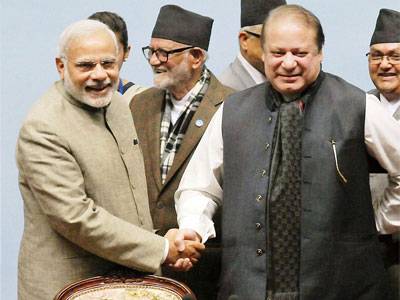India-Pak Tensions Affect Afghanistan: US
Modi and Sharif shake hands

NEW DELHI: Tension between India and Pakistan is a key obstacle to regional stability and is driving Pakistan’s strategy in Afghanistan, a top United States military officer told a Congress committee.
"Tension between India and Pakistan continue to threaten regional stability and largely drives Pakistan's regional strategy, especially as it relates to Afghanistan," US Central Command Chief General Lloyd Austin said while testifying before the Congress's House Armed Services Committee.
Referring to the withdrawal of US troops from the region as an opportunity to foster better relations with Pakistan and Afghanistan, the CENTCOM chief said, “This may encourage the two countries to find common ground in countering the violent extremist organizations operating in their border region."
The General praised Pakistan’s military offensive against militants in the country’s northwest. “We are encouraged by the leaderships' commitment to counter-insurgency operations in the FATA and openness to improve relations with Afghanistan."
The comments come as the Taliban agrees to talks with the Afghan government. It also follows a statement by the US State Department admitting that Pakistan has a clear “stake in the outcome” of the peace process in war-torn Afghanistan. “In terms of the role of Pakistan, we have long encouraged Pakistan to support (Afghan) President (Ashraf) Ghani’s reconciliation efforts,” said the department’s spokesperson Jen Psaki said. “We, of course, remain in support and in contact with President Ghani on these matters as well as certainly countries like Pakistan who have a stake in the outcome.”
At first glance, the two may seem to be unconnected developments. However, the reconciliation between Afghanistan and Pakistan -- made possible by a change of guard in Afghanistan with a new President, Ashraf Ghani, being sworn in -- has, in turn, put the Afghan peace process somewhat on track.
For the first time since the US invaded Afghanistan and toppled the Taliban government 13 years ago, has the group agreed to hold talks with the government. The Taliban has thus far refused to open a dialogue process, terming the government illegitimate and stepping up attacks on officials and security forces. This stance has claimed thousands of lives, rendering 2014, the worst year yet in terms of civilian casualties. Since 2009 -- when the UN began tracking casualties -- the armed conflict in Afghanistan has caused 47,745 civilian casualties with 17,774 Afghan civilians killed and 29,971 injured.
Pakistan’s support has been the crucial factor leading to this development, by pushing the Taliban leadership to agree to talks with the Afghan government. A report in The Express Tribune quoted an unnamed former top commander of the group saying, “Taliban officials, who had been involved in talks with the Pakistanis and the Chinese, and had sought time for consultations with the senior leaders, have received a green signal from the leadership,” adding that “Pakistani officials had advised Taliban leaders to sit face-to-face with the Afghan government and put their demands to find out a political solution to the problem.”
The same report quoted another unnamed Taliban source confirming the report and adding that “a small delegation will be visiting Pakistan in days for consultations” to be able to take the discussion with the Afghan government forward.
Relations between Afghanistan and Pakistan had dipped over the question of militancy, with Afghanistan under former President Hamid Karzai accusing Pakistan of allowing the Afghan Taliban to seek refuge and garner logistical support in Pakistan -- a charge that Pakistan has denied. As such, Pakistan has been accused of differentiating between “good” Taliban and “bad” Taliban -- the former referring to militants who focus their activities on Afghanistan and Kashmir, thereby fostering Pakistan’s influence in the region, and the latter referring to the Tehreek i Taliban Pakistan (TTP) and other groups who are waging an insurgency within Pakistan’s borders.
However, two factors have greatly changed this equation. One, the swearing-in of a new President, Ashraf Ghani, who was set to improve relations with Pakistan from the start. And two, Pakistan’s internal problem with terrorism that has forced the country to carry out a military offensive against militants in the country’s northwest, and thereby, leading to the emergence of a sort of uniform position against terrorism -- at least in the country’s northwest region-- as opposed to the distinction that has thus far been maintained.



